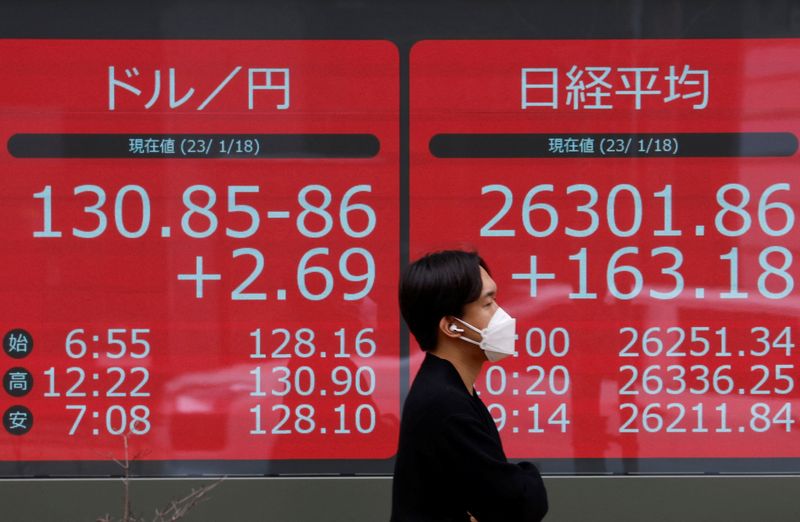By Patturaja Murugaboopathy and Brigid Riley
(Reuters) - Japanese stocks have started the year strongly and analysts say it could be a signal of further gains and expect the inflows that pushed the Nikkei to three-decade highs will keep coming.
Japanese equities received a net 1.16 trillion yen ($7.8 billion) from abroad last month, adding to inflow of 6.3 trillion yen last year, the highest since at least 2014, according to exchange data.
The Nikkei rose 8.4% for the month, and the broader Topix 7.8% - both hitting 34-year highs and outperforming global stocks' which added 0.5%.
Morgan Stanley says there is a "somewhat positive" correlation between January and full-year gains. Seven of the last 10 times full-year gains have followed January rises.
Most focus is on whether inflows will extend and dealers and analysts say they will because global allocation remains low and because domestic investors have been sellers into the rally.
"This has been primarily a foreign flows-driven start to the year," said Bruce Kirk, chief Japan equity strategist at Goldman Sachs, citing a corporate governance push driving market-friendly behaviour such as buybacks as behind the investment.
"If you see more excitement, if you see more flows ... that could have an impact on the multiple that the market is willing to sustain," he said, referring to a measure of market value.
At the end of January, the MSCI Japan's 12-month forward price-to-earnings ratio, or multiple, reached 15.1, surpassing its 10-year average of 14.1. That is well below the MSCI United States' forward P/E of 20.3 and MSCI World's 17.6.
China's poor performance also appears to have driven flows.
According to LSEG Lipper, overseas funds took $2.1 billion out of Chinese equities in January and put $2.9 billion in to Japan.
An end to decades of deflation in Japan also bodes well for corporate earnings and confidence and market-watchers expect the Bank of Japan to drag short-term interest rates out of negative territory some time in the next few months.
Bank of America analysts said they expect another 7% rise in the Topix index and Nikkei index by the end of 2024 and chief strategist Masashi Akutsu said a bullish turn from local small investors could propel the market to its 1989 highs.
Reforms have deepened the tax benefits for individual investing in equities and although historically such investors have preferred overseas markets Akutsu sees potential for individuals to shift to Japanese stocks, especially if the country achieves its goal of higher real wages.
"If real wages turn to positive territory, it would help retail investors to increase their purchasing power and confidence about the sustainability of inflation."
To be sure Japan has been a perennial disappointment. This century the Nikkei is up 90%, while the S&P 500 has more than trebled. And analysts warn that the market, which tends to move in the opposite direction to the yen, is at risk if rate hikes in Japan lift the currency.
That, however, could be offset by taking off currency hedges or, picking "the right sectors" such as banks, stocks in the AI and semiconductor ecosystem, and shares of companies with low Price-to-Book ratios and high cash balances, said BNP Paribas (OTC:BNPQY)' Head of East Asia Strategy Jason Lui.

BNP's 2024 base case for the Nikkei is for gains between 5% - 8% this year.
($1 = 147.9400 yen)